Sustainable Marketing and Competitive Advantage of Tengri: Analysis
VerifiedAdded on 2023/01/19
|13
|2647
|90
Report
AI Summary
This report provides a detailed analysis of Tengri, a London-based textile company, focusing on its sustainable marketing strategies and competitive advantages. It begins with an executive summary, followed by an introduction that emphasizes the importance of sustainability in modern business. The discussion section delves into Tengri's marketing mix (product, price, place, and promotion), product positioning, and sustainable marketing principles. The report highlights Tengri's competitive advantages, such as its unique products made from Mongolian yak wool and its commitment to sustainability. It also identifies areas for improvement, such as increasing brand awareness and customer engagement, and reducing the use of non-biodegradable materials. The report concludes by summarizing the key findings and reiterating the importance of sustainable practices for Tengri's continued success. The paper analyzes the company's approach to sustainable marketing, its strengths, weaknesses, and provides recommendations for the future. This report examines Tengri's marketing strategies, competitive advantages, and areas for improvement. The report covers topics like product, price, place, promotion, and the company's sustainable approach. The analysis provides insights into Tengri's market positioning and overall sustainability practices. The report also provides suggestions for enhancing its sustainable business practices.
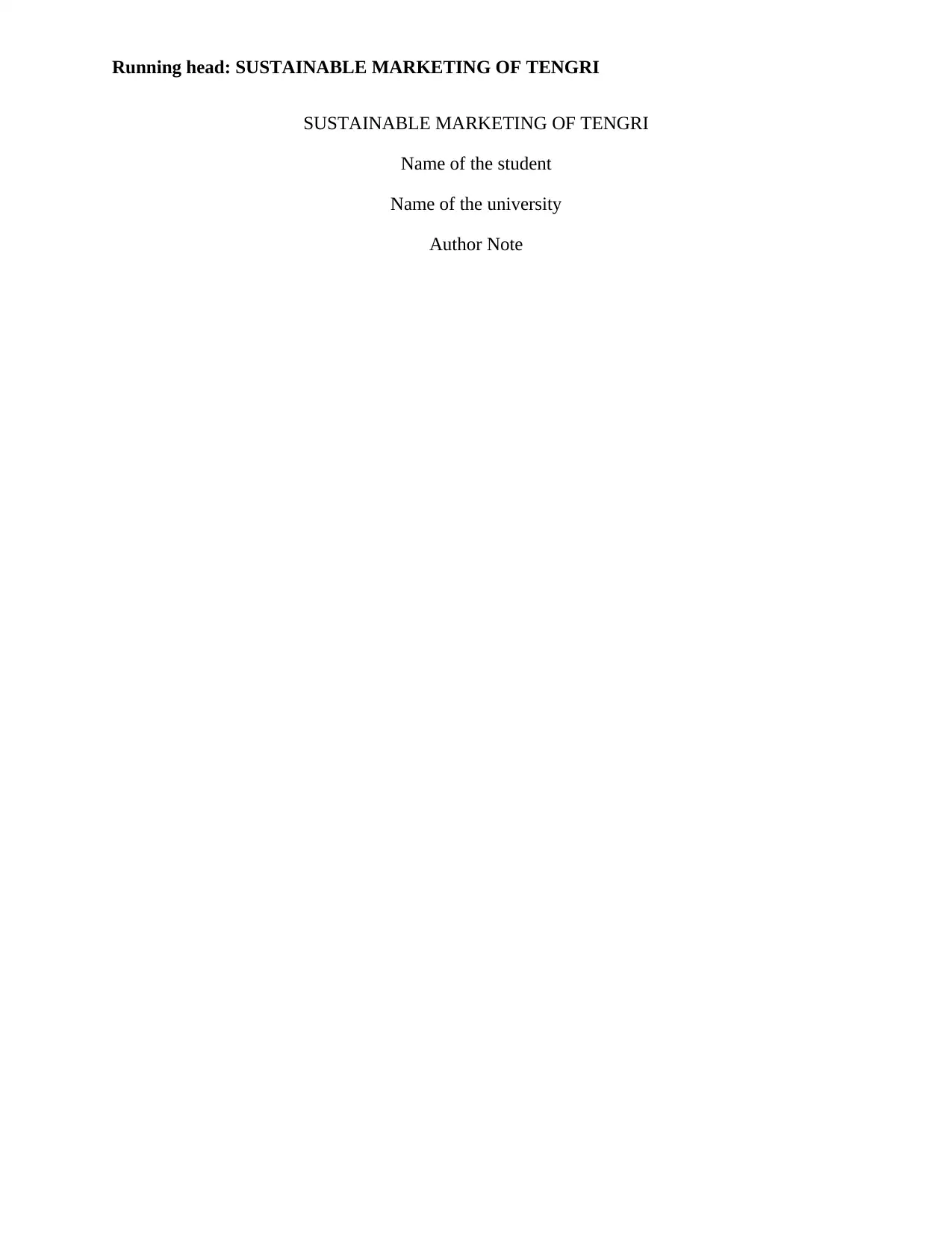
Running head: SUSTAINABLE MARKETING OF TENGRI
SUSTAINABLE MARKETING OF TENGRI
Name of the student
Name of the university
Author Note
SUSTAINABLE MARKETING OF TENGRI
Name of the student
Name of the university
Author Note
Paraphrase This Document
Need a fresh take? Get an instant paraphrase of this document with our AI Paraphraser
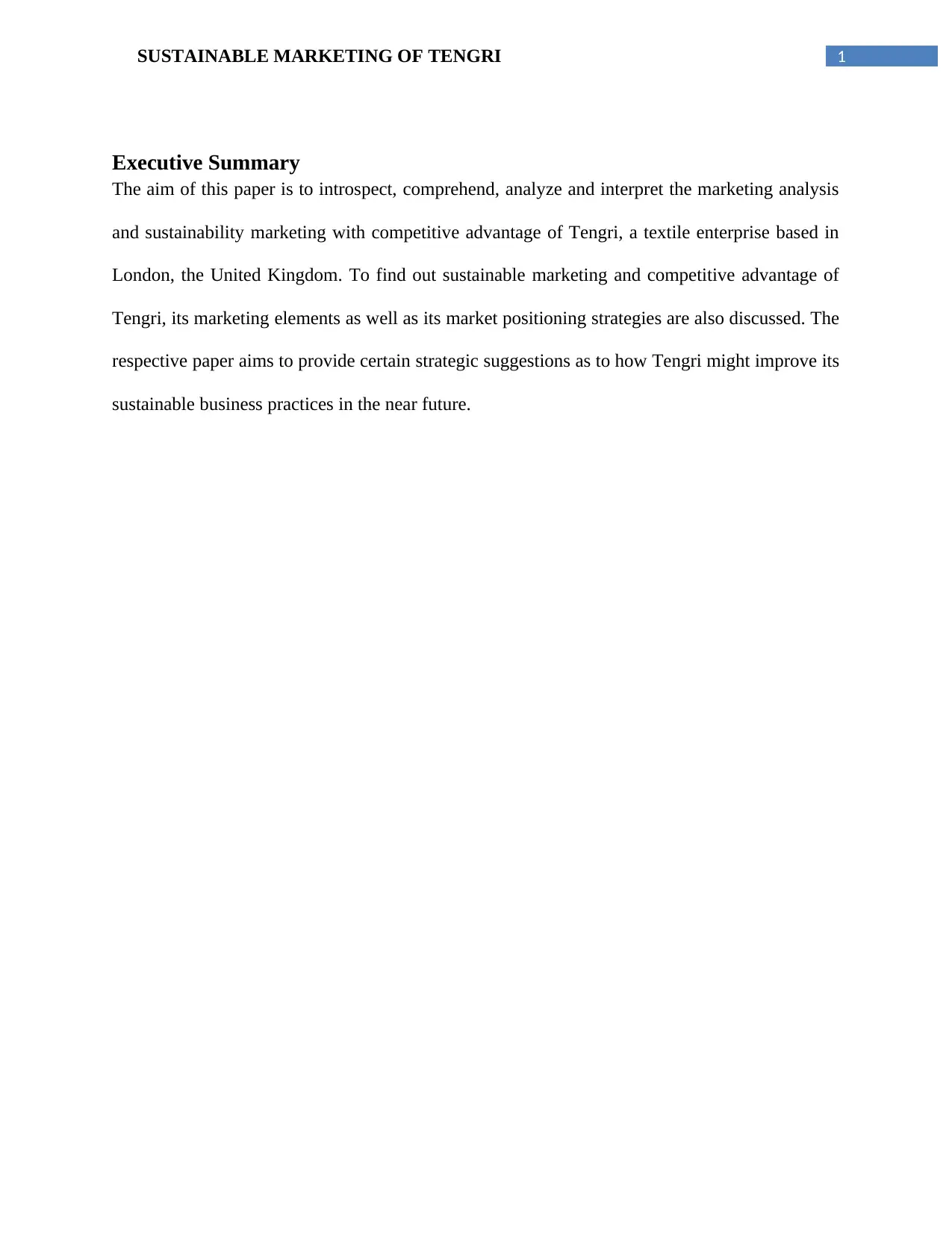
1SUSTAINABLE MARKETING OF TENGRI
Executive Summary
The aim of this paper is to introspect, comprehend, analyze and interpret the marketing analysis
and sustainability marketing with competitive advantage of Tengri, a textile enterprise based in
London, the United Kingdom. To find out sustainable marketing and competitive advantage of
Tengri, its marketing elements as well as its market positioning strategies are also discussed. The
respective paper aims to provide certain strategic suggestions as to how Tengri might improve its
sustainable business practices in the near future.
Executive Summary
The aim of this paper is to introspect, comprehend, analyze and interpret the marketing analysis
and sustainability marketing with competitive advantage of Tengri, a textile enterprise based in
London, the United Kingdom. To find out sustainable marketing and competitive advantage of
Tengri, its marketing elements as well as its market positioning strategies are also discussed. The
respective paper aims to provide certain strategic suggestions as to how Tengri might improve its
sustainable business practices in the near future.
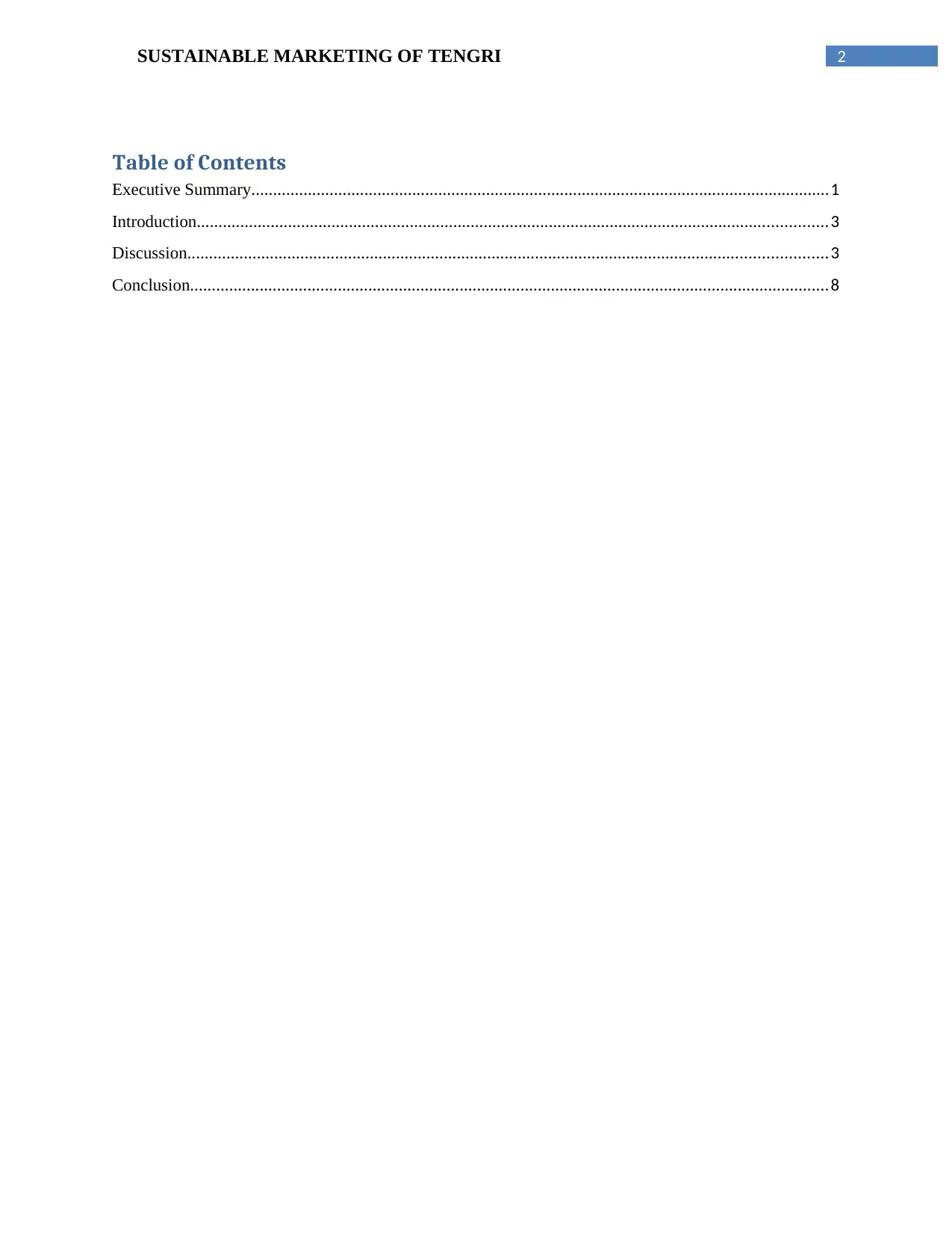
2SUSTAINABLE MARKETING OF TENGRI
Table of Contents
Executive Summary.....................................................................................................................................1
Introduction.................................................................................................................................................3
Discussion...................................................................................................................................................3
Conclusion...................................................................................................................................................8
Table of Contents
Executive Summary.....................................................................................................................................1
Introduction.................................................................................................................................................3
Discussion...................................................................................................................................................3
Conclusion...................................................................................................................................................8
⊘ This is a preview!⊘
Do you want full access?
Subscribe today to unlock all pages.

Trusted by 1+ million students worldwide
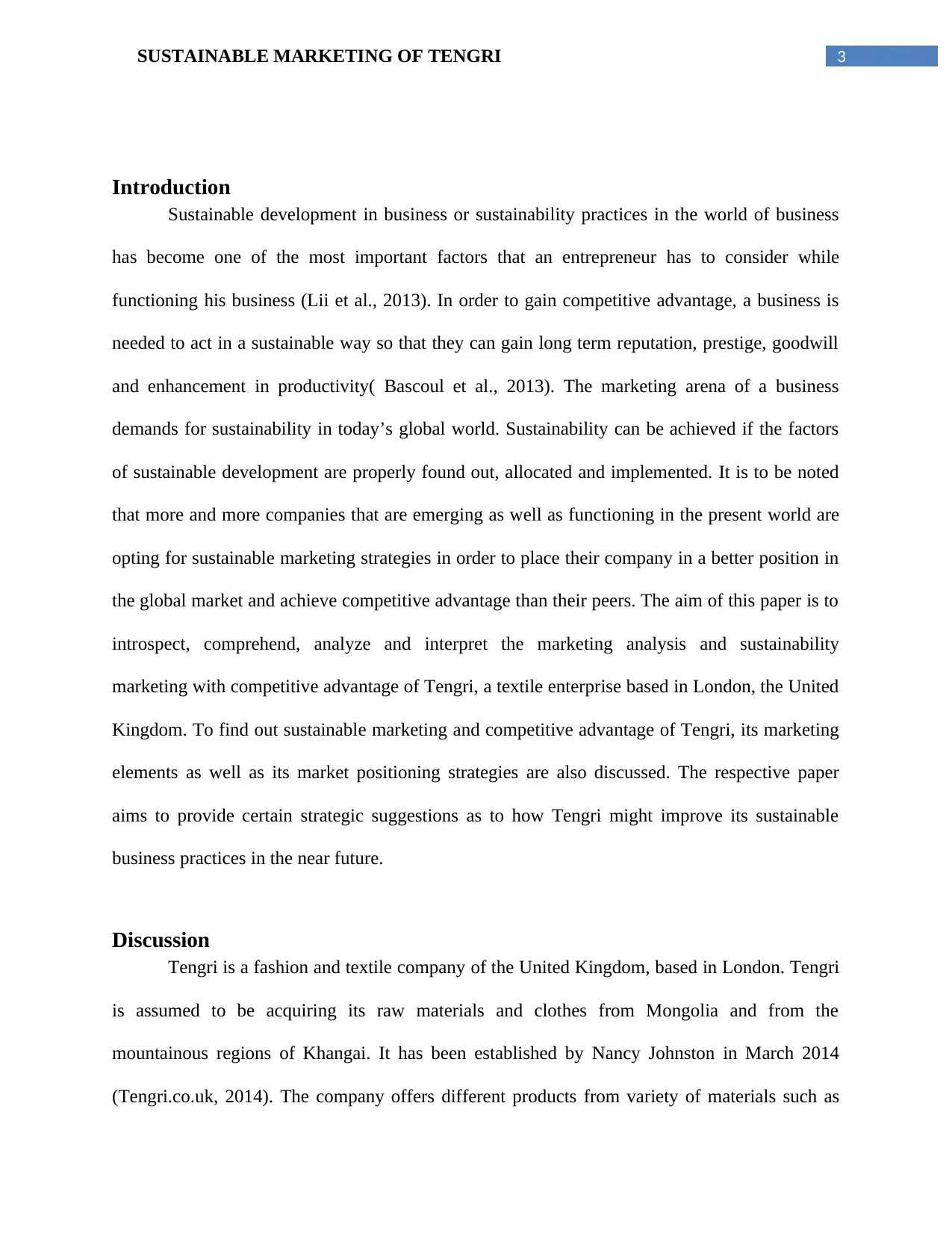
3SUSTAINABLE MARKETING OF TENGRI
Introduction
Sustainable development in business or sustainability practices in the world of business
has become one of the most important factors that an entrepreneur has to consider while
functioning his business (Lii et al., 2013). In order to gain competitive advantage, a business is
needed to act in a sustainable way so that they can gain long term reputation, prestige, goodwill
and enhancement in productivity( Bascoul et al., 2013). The marketing arena of a business
demands for sustainability in today’s global world. Sustainability can be achieved if the factors
of sustainable development are properly found out, allocated and implemented. It is to be noted
that more and more companies that are emerging as well as functioning in the present world are
opting for sustainable marketing strategies in order to place their company in a better position in
the global market and achieve competitive advantage than their peers. The aim of this paper is to
introspect, comprehend, analyze and interpret the marketing analysis and sustainability
marketing with competitive advantage of Tengri, a textile enterprise based in London, the United
Kingdom. To find out sustainable marketing and competitive advantage of Tengri, its marketing
elements as well as its market positioning strategies are also discussed. The respective paper
aims to provide certain strategic suggestions as to how Tengri might improve its sustainable
business practices in the near future.
Discussion
Tengri is a fashion and textile company of the United Kingdom, based in London. Tengri
is assumed to be acquiring its raw materials and clothes from Mongolia and from the
mountainous regions of Khangai. It has been established by Nancy Johnston in March 2014
(Tengri.co.uk, 2014). The company offers different products from variety of materials such as
Introduction
Sustainable development in business or sustainability practices in the world of business
has become one of the most important factors that an entrepreneur has to consider while
functioning his business (Lii et al., 2013). In order to gain competitive advantage, a business is
needed to act in a sustainable way so that they can gain long term reputation, prestige, goodwill
and enhancement in productivity( Bascoul et al., 2013). The marketing arena of a business
demands for sustainability in today’s global world. Sustainability can be achieved if the factors
of sustainable development are properly found out, allocated and implemented. It is to be noted
that more and more companies that are emerging as well as functioning in the present world are
opting for sustainable marketing strategies in order to place their company in a better position in
the global market and achieve competitive advantage than their peers. The aim of this paper is to
introspect, comprehend, analyze and interpret the marketing analysis and sustainability
marketing with competitive advantage of Tengri, a textile enterprise based in London, the United
Kingdom. To find out sustainable marketing and competitive advantage of Tengri, its marketing
elements as well as its market positioning strategies are also discussed. The respective paper
aims to provide certain strategic suggestions as to how Tengri might improve its sustainable
business practices in the near future.
Discussion
Tengri is a fashion and textile company of the United Kingdom, based in London. Tengri
is assumed to be acquiring its raw materials and clothes from Mongolia and from the
mountainous regions of Khangai. It has been established by Nancy Johnston in March 2014
(Tengri.co.uk, 2014). The company offers different products from variety of materials such as
Paraphrase This Document
Need a fresh take? Get an instant paraphrase of this document with our AI Paraphraser
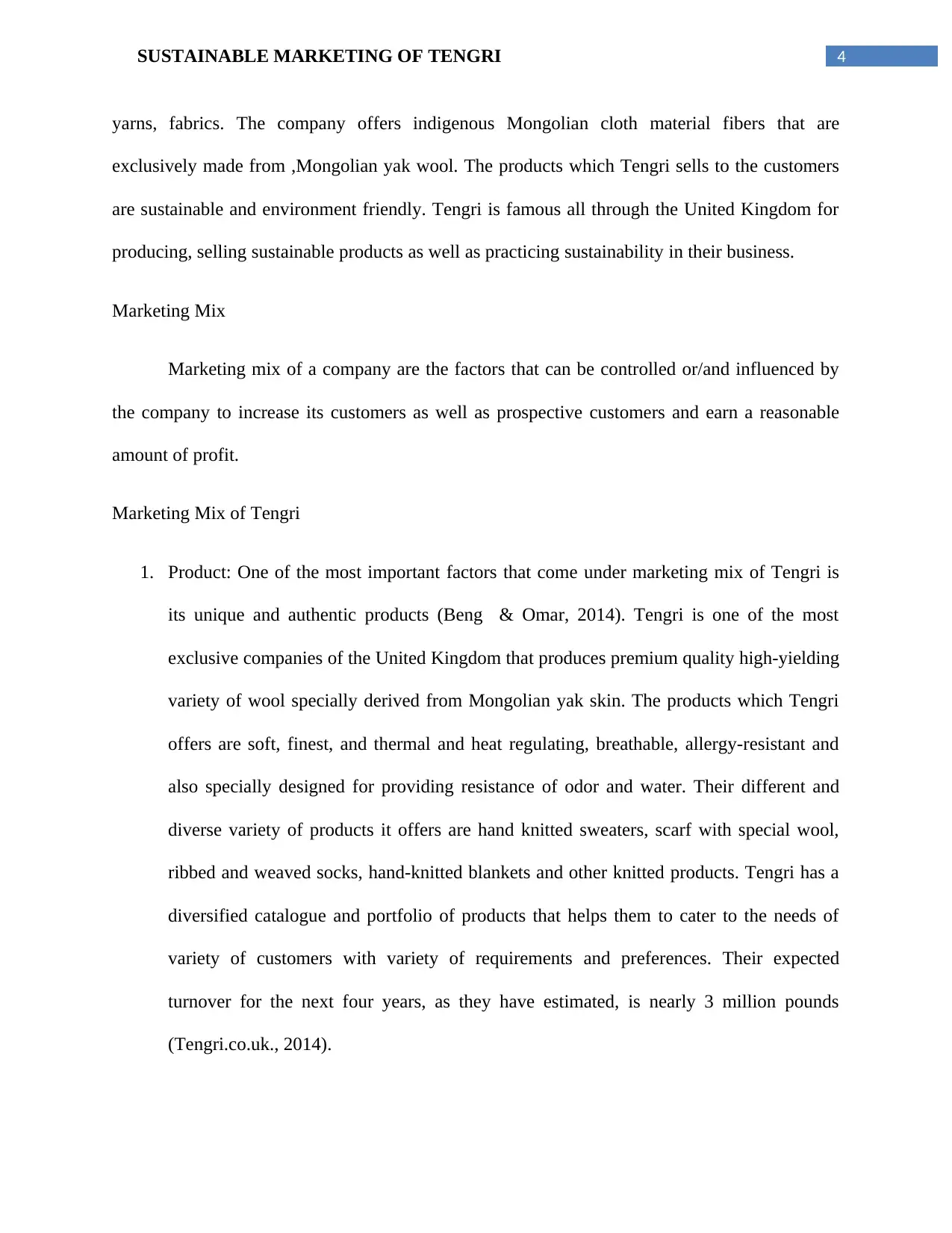
4SUSTAINABLE MARKETING OF TENGRI
yarns, fabrics. The company offers indigenous Mongolian cloth material fibers that are
exclusively made from ,Mongolian yak wool. The products which Tengri sells to the customers
are sustainable and environment friendly. Tengri is famous all through the United Kingdom for
producing, selling sustainable products as well as practicing sustainability in their business.
Marketing Mix
Marketing mix of a company are the factors that can be controlled or/and influenced by
the company to increase its customers as well as prospective customers and earn a reasonable
amount of profit.
Marketing Mix of Tengri
1. Product: One of the most important factors that come under marketing mix of Tengri is
its unique and authentic products (Beng & Omar, 2014). Tengri is one of the most
exclusive companies of the United Kingdom that produces premium quality high-yielding
variety of wool specially derived from Mongolian yak skin. The products which Tengri
offers are soft, finest, and thermal and heat regulating, breathable, allergy-resistant and
also specially designed for providing resistance of odor and water. Their different and
diverse variety of products it offers are hand knitted sweaters, scarf with special wool,
ribbed and weaved socks, hand-knitted blankets and other knitted products. Tengri has a
diversified catalogue and portfolio of products that helps them to cater to the needs of
variety of customers with variety of requirements and preferences. Their expected
turnover for the next four years, as they have estimated, is nearly 3 million pounds
(Tengri.co.uk., 2014).
yarns, fabrics. The company offers indigenous Mongolian cloth material fibers that are
exclusively made from ,Mongolian yak wool. The products which Tengri sells to the customers
are sustainable and environment friendly. Tengri is famous all through the United Kingdom for
producing, selling sustainable products as well as practicing sustainability in their business.
Marketing Mix
Marketing mix of a company are the factors that can be controlled or/and influenced by
the company to increase its customers as well as prospective customers and earn a reasonable
amount of profit.
Marketing Mix of Tengri
1. Product: One of the most important factors that come under marketing mix of Tengri is
its unique and authentic products (Beng & Omar, 2014). Tengri is one of the most
exclusive companies of the United Kingdom that produces premium quality high-yielding
variety of wool specially derived from Mongolian yak skin. The products which Tengri
offers are soft, finest, and thermal and heat regulating, breathable, allergy-resistant and
also specially designed for providing resistance of odor and water. Their different and
diverse variety of products it offers are hand knitted sweaters, scarf with special wool,
ribbed and weaved socks, hand-knitted blankets and other knitted products. Tengri has a
diversified catalogue and portfolio of products that helps them to cater to the needs of
variety of customers with variety of requirements and preferences. Their expected
turnover for the next four years, as they have estimated, is nearly 3 million pounds
(Tengri.co.uk., 2014).
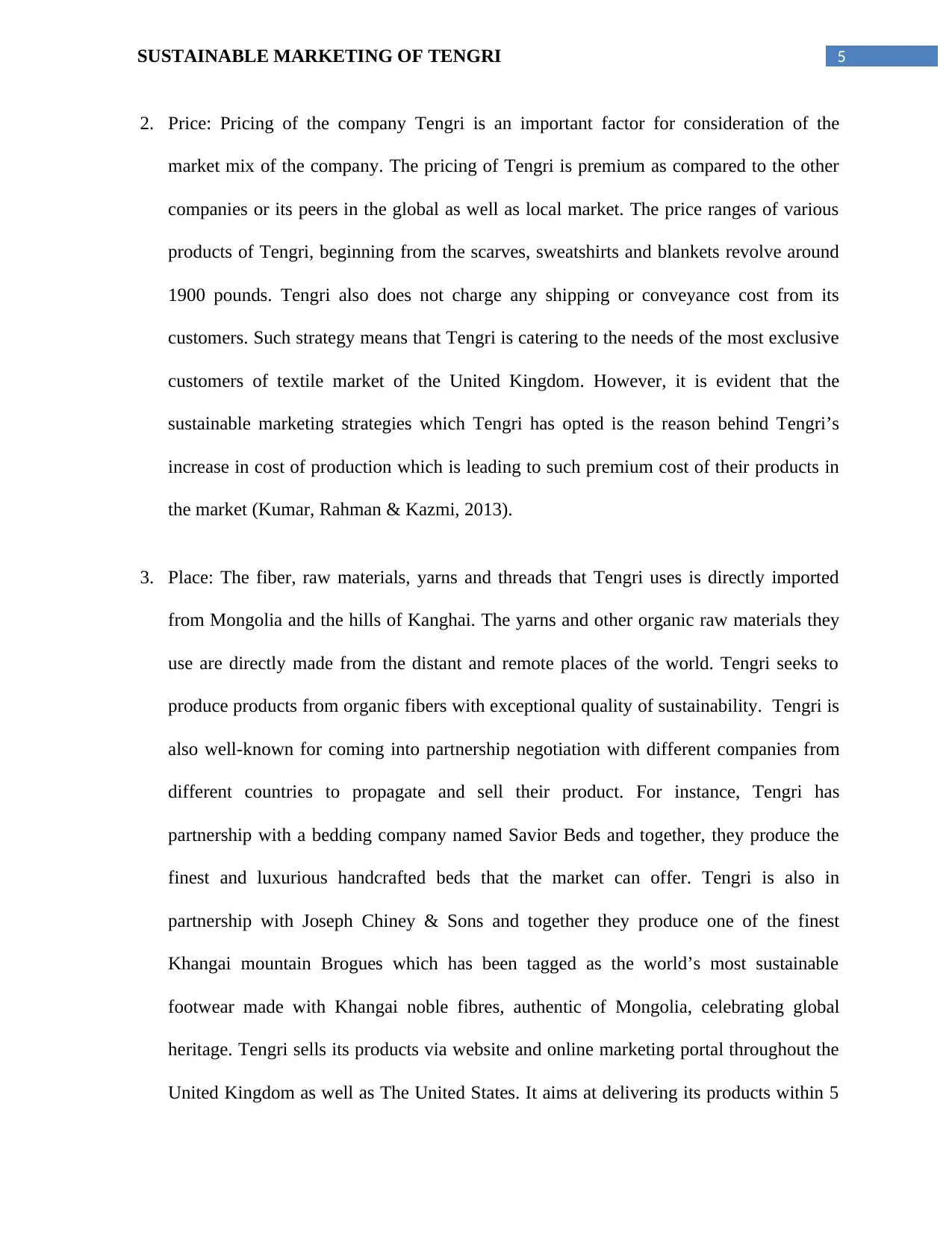
5SUSTAINABLE MARKETING OF TENGRI
2. Price: Pricing of the company Tengri is an important factor for consideration of the
market mix of the company. The pricing of Tengri is premium as compared to the other
companies or its peers in the global as well as local market. The price ranges of various
products of Tengri, beginning from the scarves, sweatshirts and blankets revolve around
1900 pounds. Tengri also does not charge any shipping or conveyance cost from its
customers. Such strategy means that Tengri is catering to the needs of the most exclusive
customers of textile market of the United Kingdom. However, it is evident that the
sustainable marketing strategies which Tengri has opted is the reason behind Tengri’s
increase in cost of production which is leading to such premium cost of their products in
the market (Kumar, Rahman & Kazmi, 2013).
3. Place: The fiber, raw materials, yarns and threads that Tengri uses is directly imported
from Mongolia and the hills of Kanghai. The yarns and other organic raw materials they
use are directly made from the distant and remote places of the world. Tengri seeks to
produce products from organic fibers with exceptional quality of sustainability. Tengri is
also well-known for coming into partnership negotiation with different companies from
different countries to propagate and sell their product. For instance, Tengri has
partnership with a bedding company named Savior Beds and together, they produce the
finest and luxurious handcrafted beds that the market can offer. Tengri is also in
partnership with Joseph Chiney & Sons and together they produce one of the finest
Khangai mountain Brogues which has been tagged as the world’s most sustainable
footwear made with Khangai noble fibres, authentic of Mongolia, celebrating global
heritage. Tengri sells its products via website and online marketing portal throughout the
United Kingdom as well as The United States. It aims at delivering its products within 5
2. Price: Pricing of the company Tengri is an important factor for consideration of the
market mix of the company. The pricing of Tengri is premium as compared to the other
companies or its peers in the global as well as local market. The price ranges of various
products of Tengri, beginning from the scarves, sweatshirts and blankets revolve around
1900 pounds. Tengri also does not charge any shipping or conveyance cost from its
customers. Such strategy means that Tengri is catering to the needs of the most exclusive
customers of textile market of the United Kingdom. However, it is evident that the
sustainable marketing strategies which Tengri has opted is the reason behind Tengri’s
increase in cost of production which is leading to such premium cost of their products in
the market (Kumar, Rahman & Kazmi, 2013).
3. Place: The fiber, raw materials, yarns and threads that Tengri uses is directly imported
from Mongolia and the hills of Kanghai. The yarns and other organic raw materials they
use are directly made from the distant and remote places of the world. Tengri seeks to
produce products from organic fibers with exceptional quality of sustainability. Tengri is
also well-known for coming into partnership negotiation with different companies from
different countries to propagate and sell their product. For instance, Tengri has
partnership with a bedding company named Savior Beds and together, they produce the
finest and luxurious handcrafted beds that the market can offer. Tengri is also in
partnership with Joseph Chiney & Sons and together they produce one of the finest
Khangai mountain Brogues which has been tagged as the world’s most sustainable
footwear made with Khangai noble fibres, authentic of Mongolia, celebrating global
heritage. Tengri sells its products via website and online marketing portal throughout the
United Kingdom as well as The United States. It aims at delivering its products within 5
⊘ This is a preview!⊘
Do you want full access?
Subscribe today to unlock all pages.

Trusted by 1+ million students worldwide
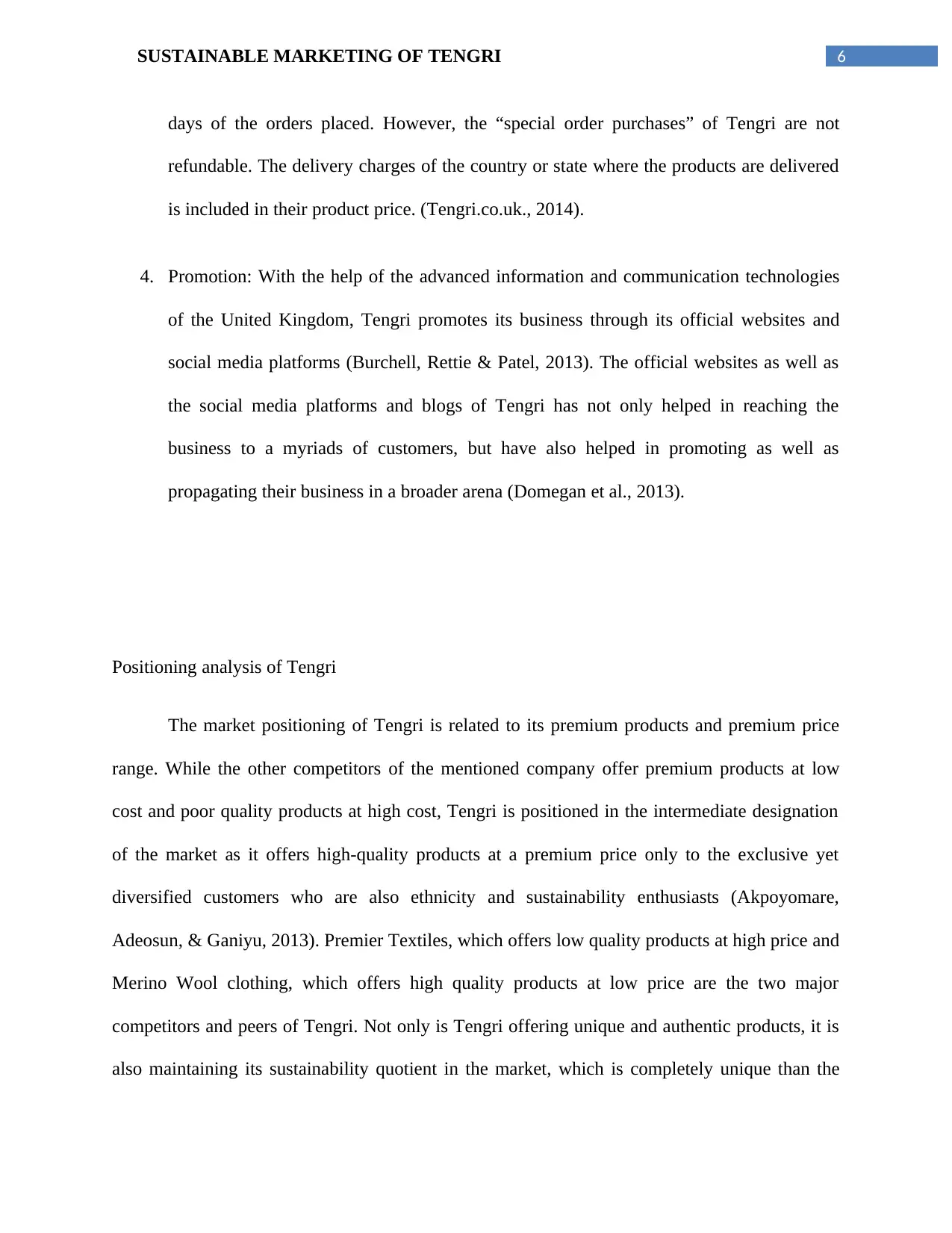
6SUSTAINABLE MARKETING OF TENGRI
days of the orders placed. However, the “special order purchases” of Tengri are not
refundable. The delivery charges of the country or state where the products are delivered
is included in their product price. (Tengri.co.uk., 2014).
4. Promotion: With the help of the advanced information and communication technologies
of the United Kingdom, Tengri promotes its business through its official websites and
social media platforms (Burchell, Rettie & Patel, 2013). The official websites as well as
the social media platforms and blogs of Tengri has not only helped in reaching the
business to a myriads of customers, but have also helped in promoting as well as
propagating their business in a broader arena (Domegan et al., 2013).
Positioning analysis of Tengri
The market positioning of Tengri is related to its premium products and premium price
range. While the other competitors of the mentioned company offer premium products at low
cost and poor quality products at high cost, Tengri is positioned in the intermediate designation
of the market as it offers high-quality products at a premium price only to the exclusive yet
diversified customers who are also ethnicity and sustainability enthusiasts (Akpoyomare,
Adeosun, & Ganiyu, 2013). Premier Textiles, which offers low quality products at high price and
Merino Wool clothing, which offers high quality products at low price are the two major
competitors and peers of Tengri. Not only is Tengri offering unique and authentic products, it is
also maintaining its sustainability quotient in the market, which is completely unique than the
days of the orders placed. However, the “special order purchases” of Tengri are not
refundable. The delivery charges of the country or state where the products are delivered
is included in their product price. (Tengri.co.uk., 2014).
4. Promotion: With the help of the advanced information and communication technologies
of the United Kingdom, Tengri promotes its business through its official websites and
social media platforms (Burchell, Rettie & Patel, 2013). The official websites as well as
the social media platforms and blogs of Tengri has not only helped in reaching the
business to a myriads of customers, but have also helped in promoting as well as
propagating their business in a broader arena (Domegan et al., 2013).
Positioning analysis of Tengri
The market positioning of Tengri is related to its premium products and premium price
range. While the other competitors of the mentioned company offer premium products at low
cost and poor quality products at high cost, Tengri is positioned in the intermediate designation
of the market as it offers high-quality products at a premium price only to the exclusive yet
diversified customers who are also ethnicity and sustainability enthusiasts (Akpoyomare,
Adeosun, & Ganiyu, 2013). Premier Textiles, which offers low quality products at high price and
Merino Wool clothing, which offers high quality products at low price are the two major
competitors and peers of Tengri. Not only is Tengri offering unique and authentic products, it is
also maintaining its sustainability quotient in the market, which is completely unique than the
Paraphrase This Document
Need a fresh take? Get an instant paraphrase of this document with our AI Paraphraser
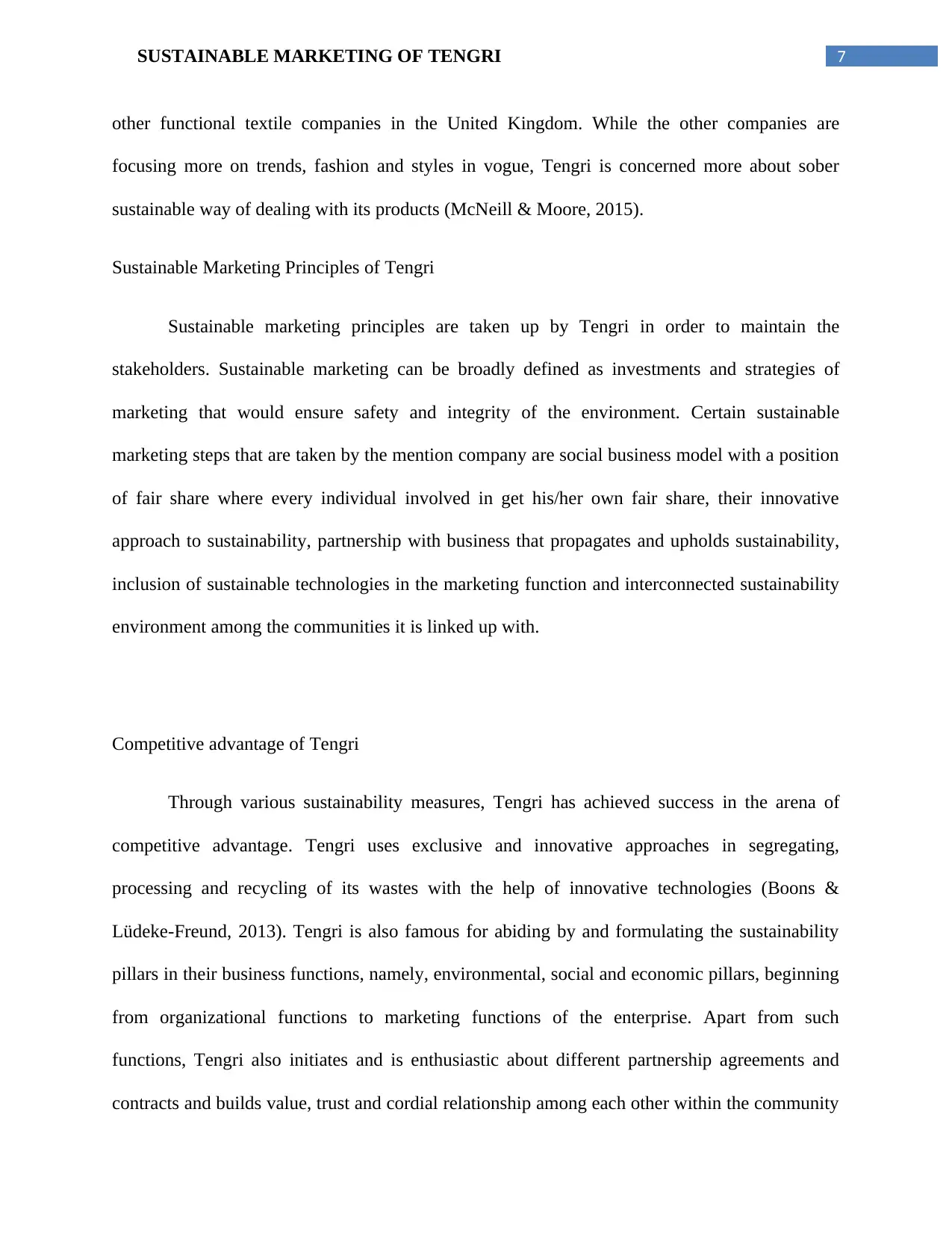
7SUSTAINABLE MARKETING OF TENGRI
other functional textile companies in the United Kingdom. While the other companies are
focusing more on trends, fashion and styles in vogue, Tengri is concerned more about sober
sustainable way of dealing with its products (McNeill & Moore, 2015).
Sustainable Marketing Principles of Tengri
Sustainable marketing principles are taken up by Tengri in order to maintain the
stakeholders. Sustainable marketing can be broadly defined as investments and strategies of
marketing that would ensure safety and integrity of the environment. Certain sustainable
marketing steps that are taken by the mention company are social business model with a position
of fair share where every individual involved in get his/her own fair share, their innovative
approach to sustainability, partnership with business that propagates and upholds sustainability,
inclusion of sustainable technologies in the marketing function and interconnected sustainability
environment among the communities it is linked up with.
Competitive advantage of Tengri
Through various sustainability measures, Tengri has achieved success in the arena of
competitive advantage. Tengri uses exclusive and innovative approaches in segregating,
processing and recycling of its wastes with the help of innovative technologies (Boons &
Lüdeke-Freund, 2013). Tengri is also famous for abiding by and formulating the sustainability
pillars in their business functions, namely, environmental, social and economic pillars, beginning
from organizational functions to marketing functions of the enterprise. Apart from such
functions, Tengri also initiates and is enthusiastic about different partnership agreements and
contracts and builds value, trust and cordial relationship among each other within the community
other functional textile companies in the United Kingdom. While the other companies are
focusing more on trends, fashion and styles in vogue, Tengri is concerned more about sober
sustainable way of dealing with its products (McNeill & Moore, 2015).
Sustainable Marketing Principles of Tengri
Sustainable marketing principles are taken up by Tengri in order to maintain the
stakeholders. Sustainable marketing can be broadly defined as investments and strategies of
marketing that would ensure safety and integrity of the environment. Certain sustainable
marketing steps that are taken by the mention company are social business model with a position
of fair share where every individual involved in get his/her own fair share, their innovative
approach to sustainability, partnership with business that propagates and upholds sustainability,
inclusion of sustainable technologies in the marketing function and interconnected sustainability
environment among the communities it is linked up with.
Competitive advantage of Tengri
Through various sustainability measures, Tengri has achieved success in the arena of
competitive advantage. Tengri uses exclusive and innovative approaches in segregating,
processing and recycling of its wastes with the help of innovative technologies (Boons &
Lüdeke-Freund, 2013). Tengri is also famous for abiding by and formulating the sustainability
pillars in their business functions, namely, environmental, social and economic pillars, beginning
from organizational functions to marketing functions of the enterprise. Apart from such
functions, Tengri also initiates and is enthusiastic about different partnership agreements and
contracts and builds value, trust and cordial relationship among each other within the community
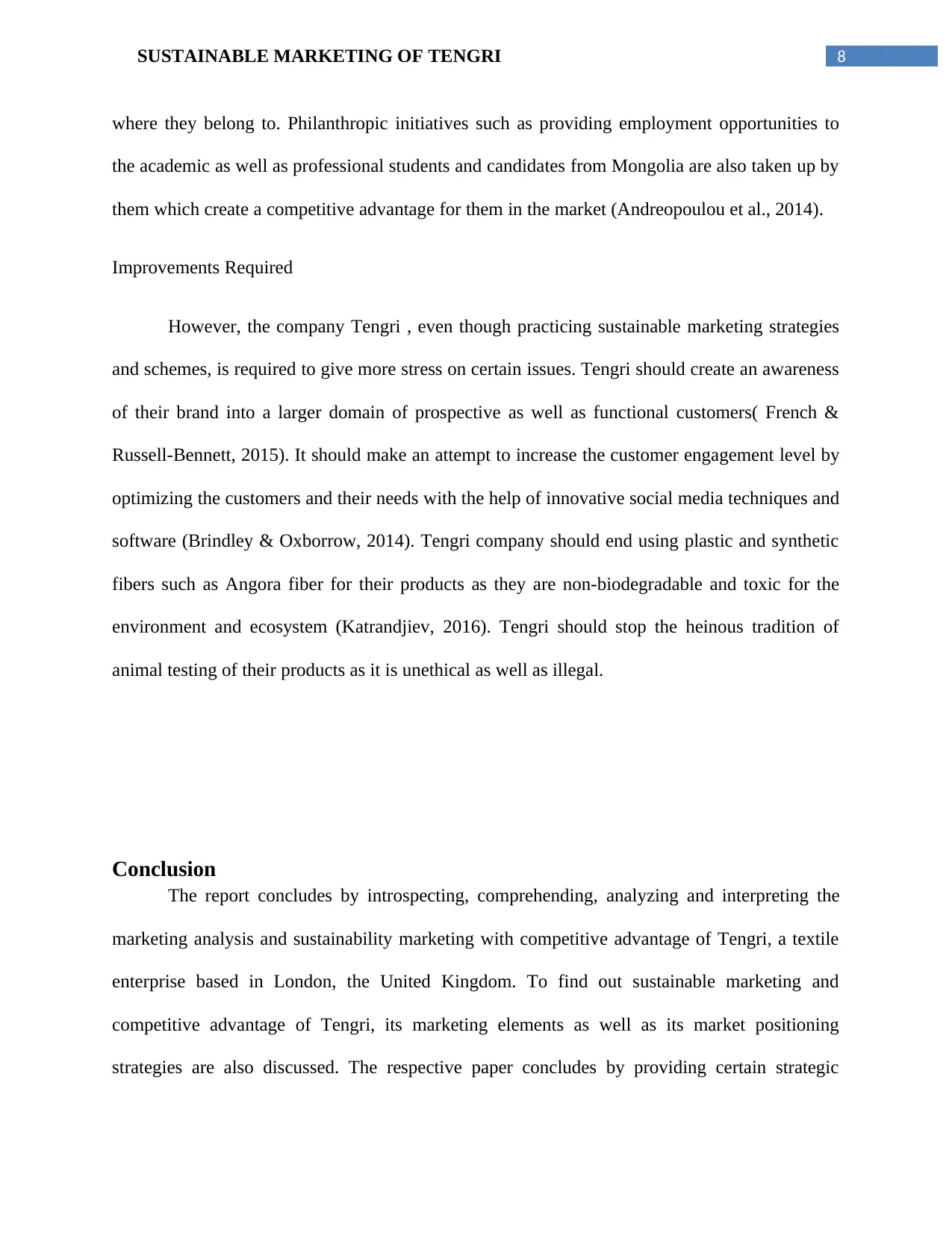
8SUSTAINABLE MARKETING OF TENGRI
where they belong to. Philanthropic initiatives such as providing employment opportunities to
the academic as well as professional students and candidates from Mongolia are also taken up by
them which create a competitive advantage for them in the market (Andreopoulou et al., 2014).
Improvements Required
However, the company Tengri , even though practicing sustainable marketing strategies
and schemes, is required to give more stress on certain issues. Tengri should create an awareness
of their brand into a larger domain of prospective as well as functional customers( French &
Russell-Bennett, 2015). It should make an attempt to increase the customer engagement level by
optimizing the customers and their needs with the help of innovative social media techniques and
software (Brindley & Oxborrow, 2014). Tengri company should end using plastic and synthetic
fibers such as Angora fiber for their products as they are non-biodegradable and toxic for the
environment and ecosystem (Katrandjiev, 2016). Tengri should stop the heinous tradition of
animal testing of their products as it is unethical as well as illegal.
Conclusion
The report concludes by introspecting, comprehending, analyzing and interpreting the
marketing analysis and sustainability marketing with competitive advantage of Tengri, a textile
enterprise based in London, the United Kingdom. To find out sustainable marketing and
competitive advantage of Tengri, its marketing elements as well as its market positioning
strategies are also discussed. The respective paper concludes by providing certain strategic
where they belong to. Philanthropic initiatives such as providing employment opportunities to
the academic as well as professional students and candidates from Mongolia are also taken up by
them which create a competitive advantage for them in the market (Andreopoulou et al., 2014).
Improvements Required
However, the company Tengri , even though practicing sustainable marketing strategies
and schemes, is required to give more stress on certain issues. Tengri should create an awareness
of their brand into a larger domain of prospective as well as functional customers( French &
Russell-Bennett, 2015). It should make an attempt to increase the customer engagement level by
optimizing the customers and their needs with the help of innovative social media techniques and
software (Brindley & Oxborrow, 2014). Tengri company should end using plastic and synthetic
fibers such as Angora fiber for their products as they are non-biodegradable and toxic for the
environment and ecosystem (Katrandjiev, 2016). Tengri should stop the heinous tradition of
animal testing of their products as it is unethical as well as illegal.
Conclusion
The report concludes by introspecting, comprehending, analyzing and interpreting the
marketing analysis and sustainability marketing with competitive advantage of Tengri, a textile
enterprise based in London, the United Kingdom. To find out sustainable marketing and
competitive advantage of Tengri, its marketing elements as well as its market positioning
strategies are also discussed. The respective paper concludes by providing certain strategic
⊘ This is a preview!⊘
Do you want full access?
Subscribe today to unlock all pages.

Trusted by 1+ million students worldwide
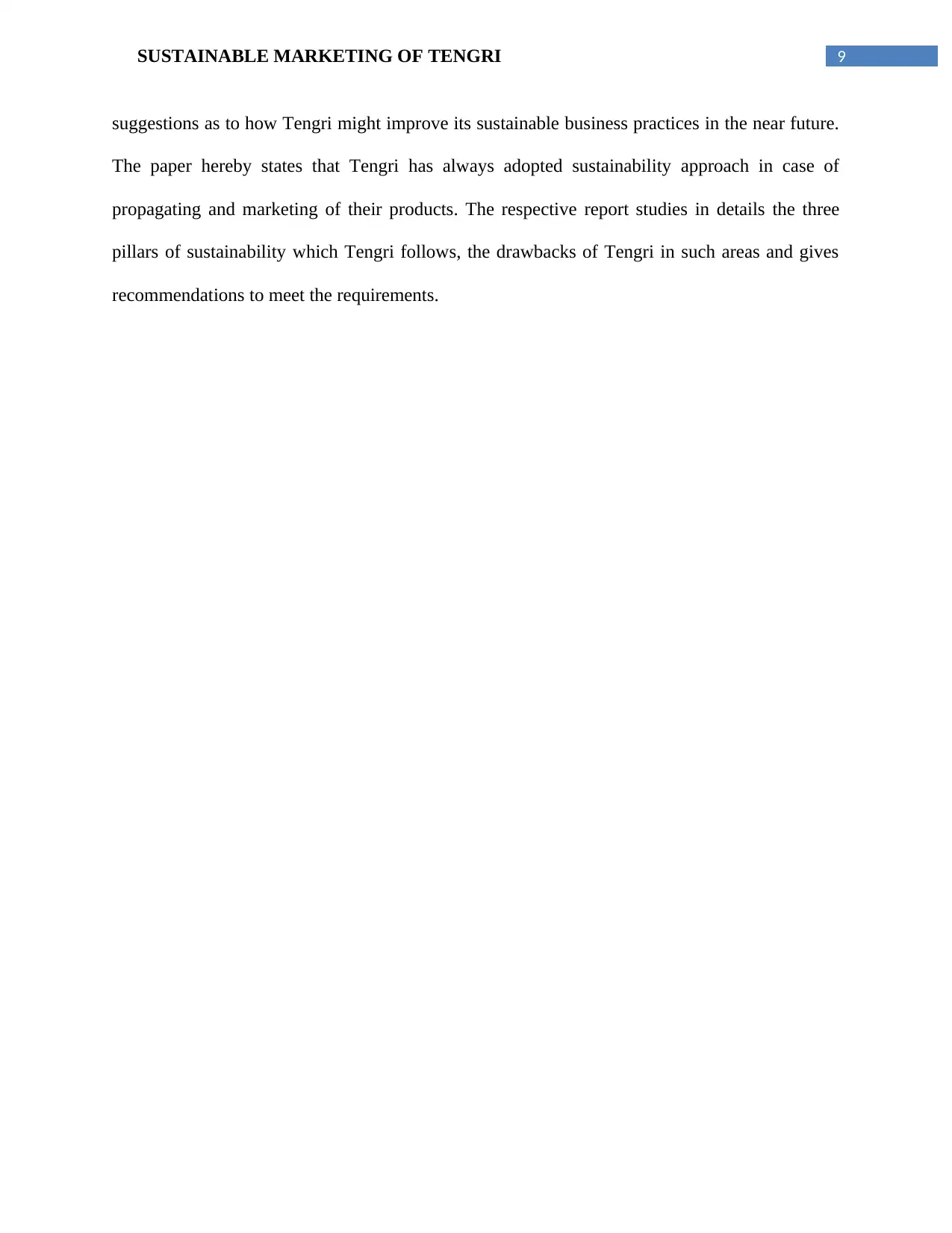
9SUSTAINABLE MARKETING OF TENGRI
suggestions as to how Tengri might improve its sustainable business practices in the near future.
The paper hereby states that Tengri has always adopted sustainability approach in case of
propagating and marketing of their products. The respective report studies in details the three
pillars of sustainability which Tengri follows, the drawbacks of Tengri in such areas and gives
recommendations to meet the requirements.
suggestions as to how Tengri might improve its sustainable business practices in the near future.
The paper hereby states that Tengri has always adopted sustainability approach in case of
propagating and marketing of their products. The respective report studies in details the three
pillars of sustainability which Tengri follows, the drawbacks of Tengri in such areas and gives
recommendations to meet the requirements.
Paraphrase This Document
Need a fresh take? Get an instant paraphrase of this document with our AI Paraphraser
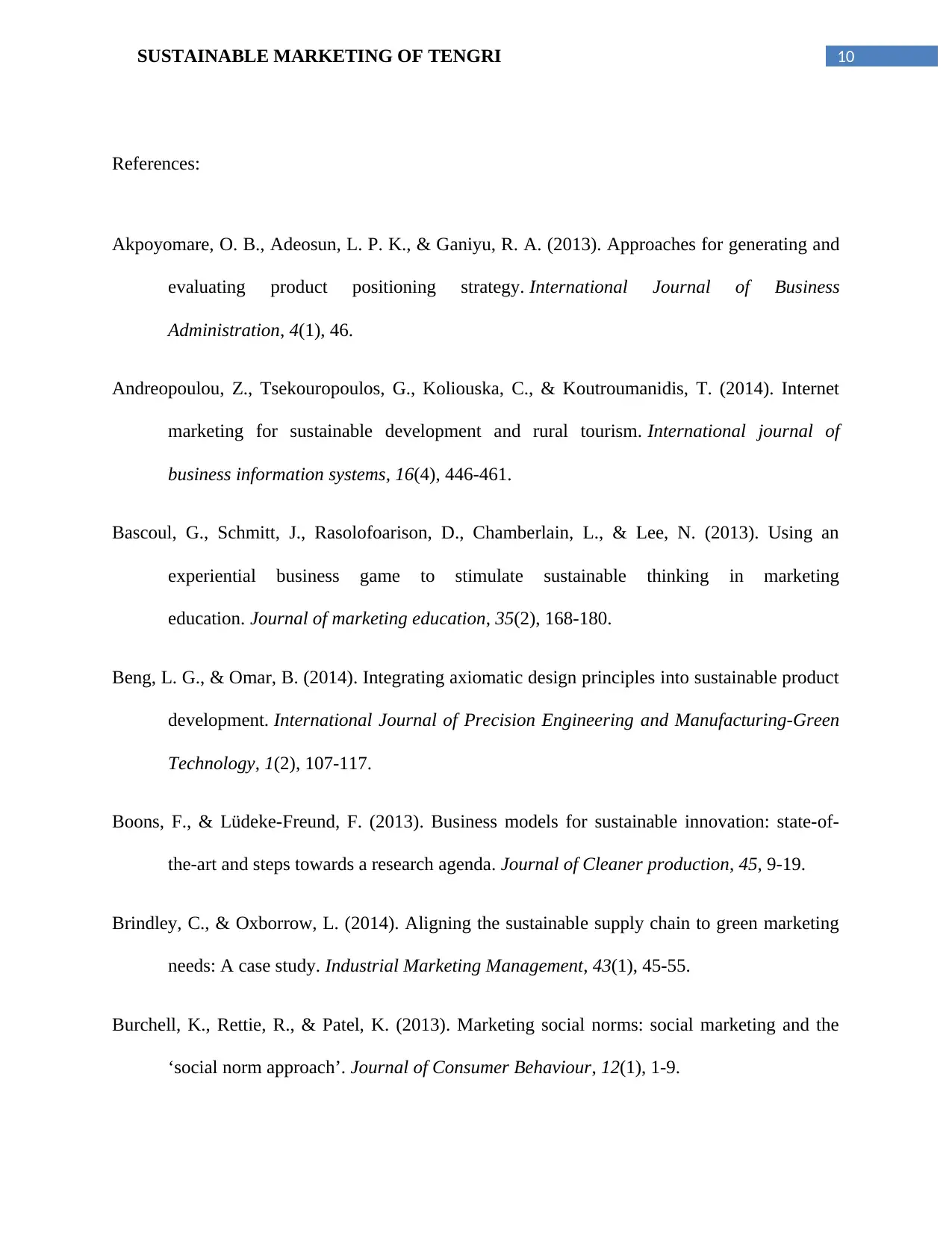
10SUSTAINABLE MARKETING OF TENGRI
References:
Akpoyomare, O. B., Adeosun, L. P. K., & Ganiyu, R. A. (2013). Approaches for generating and
evaluating product positioning strategy. International Journal of Business
Administration, 4(1), 46.
Andreopoulou, Z., Tsekouropoulos, G., Koliouska, C., & Koutroumanidis, T. (2014). Internet
marketing for sustainable development and rural tourism. International journal of
business information systems, 16(4), 446-461.
Bascoul, G., Schmitt, J., Rasolofoarison, D., Chamberlain, L., & Lee, N. (2013). Using an
experiential business game to stimulate sustainable thinking in marketing
education. Journal of marketing education, 35(2), 168-180.
Beng, L. G., & Omar, B. (2014). Integrating axiomatic design principles into sustainable product
development. International Journal of Precision Engineering and Manufacturing-Green
Technology, 1(2), 107-117.
Boons, F., & Lüdeke-Freund, F. (2013). Business models for sustainable innovation: state-of-
the-art and steps towards a research agenda. Journal of Cleaner production, 45, 9-19.
Brindley, C., & Oxborrow, L. (2014). Aligning the sustainable supply chain to green marketing
needs: A case study. Industrial Marketing Management, 43(1), 45-55.
Burchell, K., Rettie, R., & Patel, K. (2013). Marketing social norms: social marketing and the
‘social norm approach’. Journal of Consumer Behaviour, 12(1), 1-9.
References:
Akpoyomare, O. B., Adeosun, L. P. K., & Ganiyu, R. A. (2013). Approaches for generating and
evaluating product positioning strategy. International Journal of Business
Administration, 4(1), 46.
Andreopoulou, Z., Tsekouropoulos, G., Koliouska, C., & Koutroumanidis, T. (2014). Internet
marketing for sustainable development and rural tourism. International journal of
business information systems, 16(4), 446-461.
Bascoul, G., Schmitt, J., Rasolofoarison, D., Chamberlain, L., & Lee, N. (2013). Using an
experiential business game to stimulate sustainable thinking in marketing
education. Journal of marketing education, 35(2), 168-180.
Beng, L. G., & Omar, B. (2014). Integrating axiomatic design principles into sustainable product
development. International Journal of Precision Engineering and Manufacturing-Green
Technology, 1(2), 107-117.
Boons, F., & Lüdeke-Freund, F. (2013). Business models for sustainable innovation: state-of-
the-art and steps towards a research agenda. Journal of Cleaner production, 45, 9-19.
Brindley, C., & Oxborrow, L. (2014). Aligning the sustainable supply chain to green marketing
needs: A case study. Industrial Marketing Management, 43(1), 45-55.
Burchell, K., Rettie, R., & Patel, K. (2013). Marketing social norms: social marketing and the
‘social norm approach’. Journal of Consumer Behaviour, 12(1), 1-9.
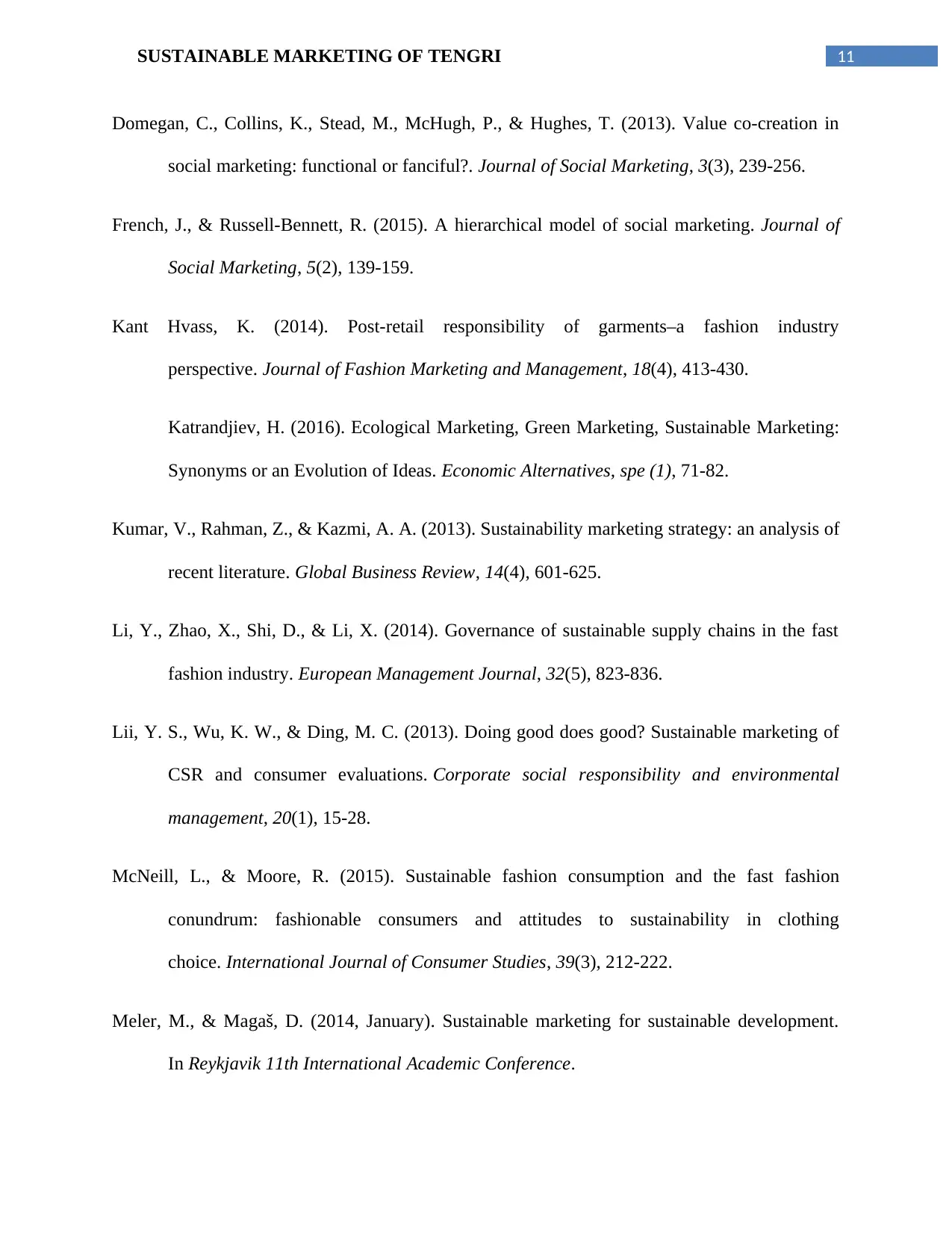
11SUSTAINABLE MARKETING OF TENGRI
Domegan, C., Collins, K., Stead, M., McHugh, P., & Hughes, T. (2013). Value co-creation in
social marketing: functional or fanciful?. Journal of Social Marketing, 3(3), 239-256.
French, J., & Russell-Bennett, R. (2015). A hierarchical model of social marketing. Journal of
Social Marketing, 5(2), 139-159.
Kant Hvass, K. (2014). Post-retail responsibility of garments–a fashion industry
perspective. Journal of Fashion Marketing and Management, 18(4), 413-430.
Katrandjiev, H. (2016). Ecological Marketing, Green Marketing, Sustainable Marketing:
Synonyms оr аn Evolution оf Ideas. Economic Alternatives, spe (1), 71-82.
Kumar, V., Rahman, Z., & Kazmi, A. A. (2013). Sustainability marketing strategy: an analysis of
recent literature. Global Business Review, 14(4), 601-625.
Li, Y., Zhao, X., Shi, D., & Li, X. (2014). Governance of sustainable supply chains in the fast
fashion industry. European Management Journal, 32(5), 823-836.
Lii, Y. S., Wu, K. W., & Ding, M. C. (2013). Doing good does good? Sustainable marketing of
CSR and consumer evaluations. Corporate social responsibility and environmental
management, 20(1), 15-28.
McNeill, L., & Moore, R. (2015). Sustainable fashion consumption and the fast fashion
conundrum: fashionable consumers and attitudes to sustainability in clothing
choice. International Journal of Consumer Studies, 39(3), 212-222.
Meler, M., & Magaš, D. (2014, January). Sustainable marketing for sustainable development.
In Reykjavik 11th International Academic Conference.
Domegan, C., Collins, K., Stead, M., McHugh, P., & Hughes, T. (2013). Value co-creation in
social marketing: functional or fanciful?. Journal of Social Marketing, 3(3), 239-256.
French, J., & Russell-Bennett, R. (2015). A hierarchical model of social marketing. Journal of
Social Marketing, 5(2), 139-159.
Kant Hvass, K. (2014). Post-retail responsibility of garments–a fashion industry
perspective. Journal of Fashion Marketing and Management, 18(4), 413-430.
Katrandjiev, H. (2016). Ecological Marketing, Green Marketing, Sustainable Marketing:
Synonyms оr аn Evolution оf Ideas. Economic Alternatives, spe (1), 71-82.
Kumar, V., Rahman, Z., & Kazmi, A. A. (2013). Sustainability marketing strategy: an analysis of
recent literature. Global Business Review, 14(4), 601-625.
Li, Y., Zhao, X., Shi, D., & Li, X. (2014). Governance of sustainable supply chains in the fast
fashion industry. European Management Journal, 32(5), 823-836.
Lii, Y. S., Wu, K. W., & Ding, M. C. (2013). Doing good does good? Sustainable marketing of
CSR and consumer evaluations. Corporate social responsibility and environmental
management, 20(1), 15-28.
McNeill, L., & Moore, R. (2015). Sustainable fashion consumption and the fast fashion
conundrum: fashionable consumers and attitudes to sustainability in clothing
choice. International Journal of Consumer Studies, 39(3), 212-222.
Meler, M., & Magaš, D. (2014, January). Sustainable marketing for sustainable development.
In Reykjavik 11th International Academic Conference.
⊘ This is a preview!⊘
Do you want full access?
Subscribe today to unlock all pages.

Trusted by 1+ million students worldwide
1 out of 13
Related Documents
Your All-in-One AI-Powered Toolkit for Academic Success.
+13062052269
info@desklib.com
Available 24*7 on WhatsApp / Email
![[object Object]](/_next/static/media/star-bottom.7253800d.svg)
Unlock your academic potential
Copyright © 2020–2026 A2Z Services. All Rights Reserved. Developed and managed by ZUCOL.




